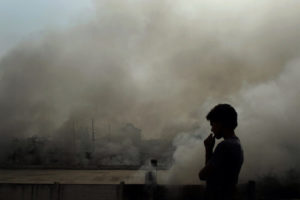Air Pollution Can Affect Sperm Negatively- Says The Research

Talking about air pollution which has always been a concerned issue in many countries especially in India with increasing population, urbanization and means of transportation has numerous worse effects on living organisms and their cytology. It wouldn’t be imprecise to say India is an under-construction country where pollution is a certain factor. The worst ever consequences of air pollution has been recently witnessed by India’s capital city Delhi that made the government for declaration of shutting down of schools, modes of communication and even working companies. Apart from all these aftermath of air pollution, recently a new concern has been highlighted about air pollution can affect sperm negatively.
Certain Negative Impacts of Air Pollution
The rising levels of air pollution in our country is now a serious matter of concern and the government of India being attentive trying to make the environment safer for people and living organisms by taking necessary preventive measures such as using sustainable and eco-friendly products, recycling of wastes, sewage water treatment, conserving resources, air pollution filters and many more. But the impacts are still active causing permanent damage to living organisms and environment such as respiratory problems, lungs infection, eye irritation causing retina damage and blindness, skin disorders and hair problems, poor growth of plants and trees and many more. But it doesn’t stop here. Now new, researches and studies have proved that air pollution can affect sperm quality negatively too.
Research Studies and Medical Examinations
According to the Chinese University of Hong Kong researcher Dr. Lao Xiang Qian, when we breathe polluted air the fine particles along with toxic chemicals and heavy metals pass into our lungs entering our bloodstream causes semen or sperm damage. These miniscule particles are particularly hazardous because of its size which is 30 times smaller than the thickness of human hair which makes it quite easier to get inhaled deep into human lungs. To make the study crystal clear, the researchers in Taiwan took into account sperm quality samples from over 6,500 men all between the groups of 15-49 years to match it against those miniscule fine particles around their daily environment. The result of the study implies that a significant number of couples could suffer from temporary or permanent infertility which means air pollution can affect sperm quality negatively.
Link between Air Pollution and Sperm Quality

All these studies carried out by researchers and health organizations concluded that air pollution is indeed linked with 26 percent increase in the risk of being in the most lowest 10 percent of average sperm size and shape. Hence the bottom-line is men who breathe in more smoggy chemically filled air are more likely to have abnormal shaped and smaller sperm. But the interesting outcome of these studies was, although the shape and size of the sperm changed due to air pollution there was a significant increase in total sperm count which is suspected to be the body’s compensation for the otherwise lower sperm quality by the researchers. As these researches and studies were observational, means researchers were just tracking and going according to the data and results over time and factors without carrying out the direct study about the effects of air pollution on male fertility. But some direct experiments carried on animals concluded that a specific metal found in polluted air called as cadmium whose source is from burning fossil fuels and polycyclic aromatic hydrocarbons causes sperm damage. In short, studies still want people to believe air pollution can actually affect sperm negatively.
Precautions and Preventive Measures
No matter how hazardous our environment and climatic factors become, we should understand the importance of our health and our serious concern towards it. To make sure our health should be in our hands, one has to be very attentive, concerned and practical for his health. Sperm quality needs to be enhanced and maintained when it comes to family planning hence some of the safe side precautions and preventive measures should be taken care of in order to avoid any damage or negative effect on sperm or male fertility due to air pollution or any serious reason.
Recommended: How to Boost Up Sperm Count Naturally
1. Eating walnuts and bananas
Walnuts are rich source of omega 3 fatty acids that increases the blood flow to the male genitals increasing the sperm count. Bananas are the best fruit to enhance sperm quality as they are rich in vitamin A,C,B1 and an enzyme called bromelain who are known to be the elements for enhancing body’s ability to produce healthy sperms.

2. Adding dark chocolates and garlic to diet
Garlics are not much liked by anyone due to its pungent smell but a key ingredient called allicin helps to improve sperm, to boost blood flow to genitals and to protect sperm from getting damaged. The antioxidant called selenium present in garlic improves sperm motility. Dark chocolates are rich in amino acids and antioxidants that improves sperm count and semen volume.
3. Avoid using laptops on your lap

Using laptops on laps are very commonly seen in these days like it has become a part of our lifestyle. Air pollution might affect sperm negatively but the heat produced from the bottom-base of the laptop between the base and your thighs can increase a man’s scrotal temperature damaging the testes and ruining the sperm quality making the infertility condition even worse.
4. Avoid taking hot shower
Prolonged and regular exposure to heat can affect sperm production negatively causing the body to produce fewer sperm and structural defected sperm. Excess exposure to heat can damage testes permanently and can also affect sperm motility.
Recommended For You
What You Need to Know About Complex Vascular Diseases
Priyadarshini Muduli
A full time passionate writer with imperishable determination to bring healthy, smart and pragmatic changes individually and socially. Concentrate especially on lifestyle, life and personal improvement, relationships, mental health and behavior, viral issues and literature based subjects.




